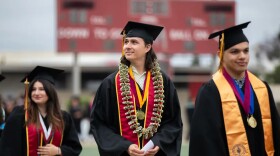ROBERT SIEGEL, host:
There are 27 million Americans between the ages of 18 and 24, and according to a poll conducted for Harvard University's Institute of Politics, their rate of participation in next week's elections could approach record levels for young voters. The record isn't very impressive. In 1982, 26.6 percent of this age group voted. This year, 32 percent told the Harvard poll that they will definitely vote.
Jeanne Shaheen, the former Democratic governor of New Hampshire, is director of the Institute of Politics and joins us. Welcome onto the program.
Ms. JEANNE SHAHEEN (Harvard University): Thank you, nice to be here.
SIEGEL: I'd like you to put your anticipation of a relatively high turnout for young people in some context. If, say, nearly 30 percent were to vote next week, how would that stack up with more recent mid-term elections than 1982?
Ms. SHAHEEN: Well, young people turned out in 2002 at only a percentage level of 21 percent, so it would be significantly higher than that. And I think to put it in context that we are quite hopeful about, leading up to the 2004 election, we have seen increased engagement on the part of young people, and despite the predictions, they did turn out in record numbers in 2004 for the college age voters. They turned out in the greatest numbers, percentage levels, since 1972, when they first got the right to vote.
So what we are seeing in this survey is a continuation of that increased engagement, and we hope that that's going to translate into a higher percentage of voters next week.
SIEGEL: But when you compare this group of young Americans with the population at large, what are the notable differences between their opinions and the opinions of the whole population?
Ms. SHAHEEN: Well, like the rest of the population, they overwhelmingly believe, six in 10, that the country is going in the wrong direction. They also disapprove of the job that President Bush has been doing. Sixty-eight percent of them do not approve of the job that he's been doing.
But what's interesting is when you ask them about how they feel about some of the institutions in this country, we see real differences with the electorate as a whole.
SIEGEL: Yeah, the young people have an even lower opinion of the media than Americans at large do.
Ms. SHAHEEN: That's right, and they have a higher opinion of the military. They trust the United Nations more than they trust the federal government or Congress or the president, which is very different than the electorate as a whole. This is a very global generation. They are what we call instead of the me generation, the we generation. They're quite humanitarian and service oriented in their approach.
SIEGEL: These are Americans who were age 13 to 19, roughly, at the moment of 9/11.
Ms. SHAHEEN: Right.
SIEGEL: And your conclusions from this poll are 9/11 is the decisive moment for them in defining their political lives.
Ms. SHAHEEN: That's right. They were at very impressionable ages, and that event had a huge impact on how they view the world, and it was followed by engagement in Iraq, it was followed by Hurricane Katrina and it has really shaped their views of politics and public life. They are, while still being relatively cynical, have translated those events into a belief that politics is relevant in their lives and that they need to get more engaged.
SIEGEL: Well, Jeanne Shaheen, thank you very much for talking with us.
Ms. SHAHEEN: Nice to be here.
SIEGEL: Jeanne Shaheen is the former Democratic governor of New Hampshire. She is now director of Harvard University's Institute of Politics. And you can read the full results of the institute's survey of 18- to 24-year-olds at NPR.org. Transcript provided by NPR, Copyright NPR.





